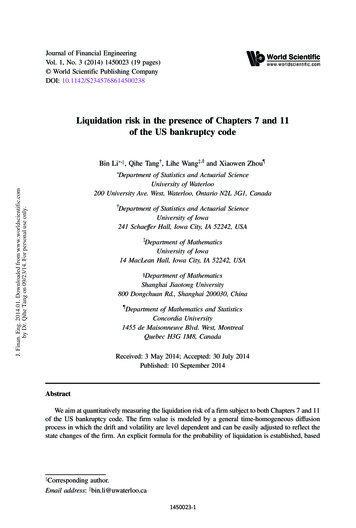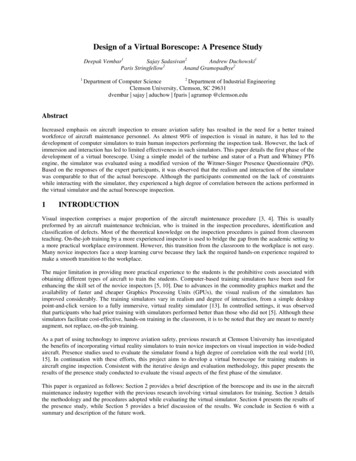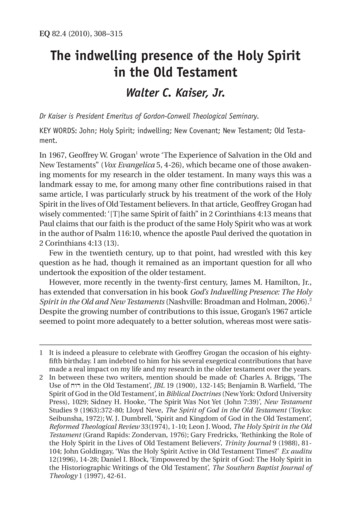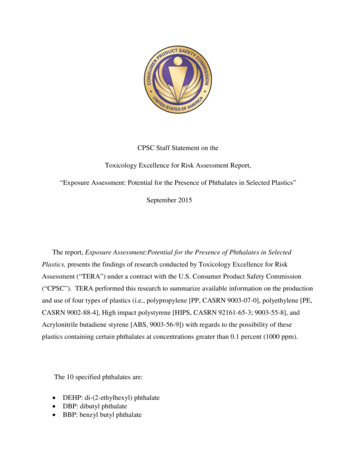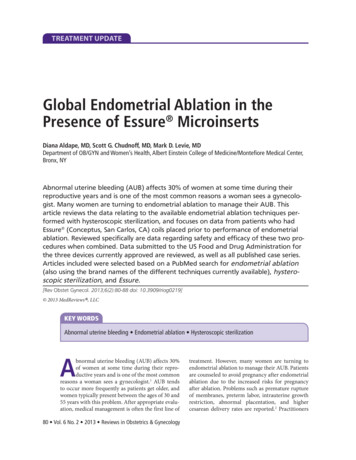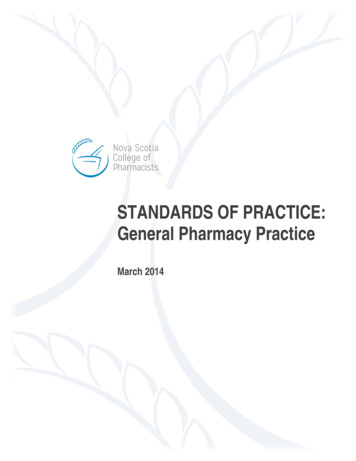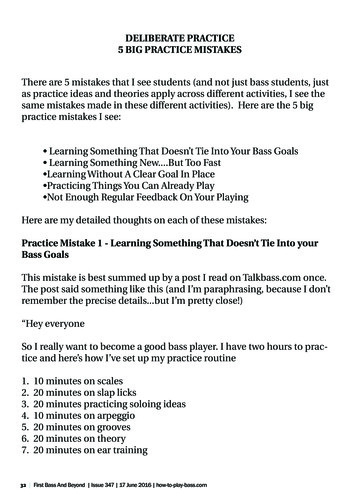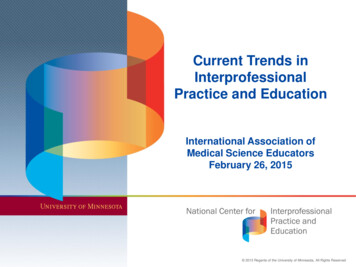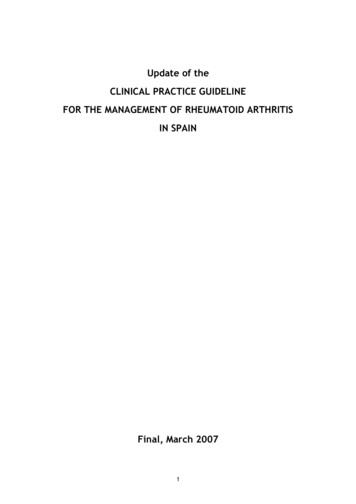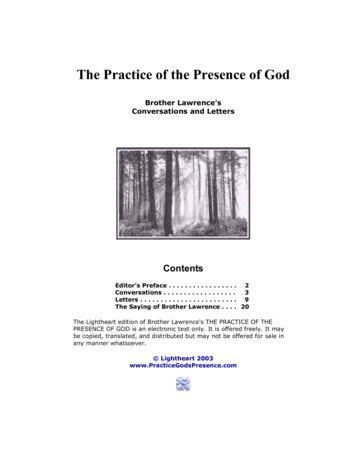
Transcription
The Practice of the Presence of GodBrother Lawrence'sConversations and LettersContentsEditor’s Preface . . . . . . . . . . . . . . . . . 2Conversations . . . . . . . . . . . . . . . . . .3Letters . . . . . . . . . . . . . . . . . . . . . . . . 9The Saying of Brother Lawrence . . . . 20The Lightheart edition of Brother Lawrence's THE PRACTICE OF THEPRESENCE OF GOD is an electronic text only. It is offered freely. It maybe copied, translated, and distributed but may not be offered for sale inany manner whatsoever. Lightheart 2003www.PracticeGodsPresence.com
Editor's PrefaceBrother Lawrence was born Nicholas Herman around 1610 in Herimenil, Lorraine, aDuchy of France. His birth records were destroyed in a fire at his parish church duringthe Thirty Years War, a war in which he fought as a young soldier. It was also the war inwhich he sustained a near fatal injury to his sciatic nerve. The injury left him quitecrippled and in chronic pain for the rest of his life.The details of his early life are few and sketchy. However, we know he was educatedboth at home and by his parish priest whose first name was Lawrence and who wasgreatly admired by the young Nicholas. He was well read and, from an early age, drawnto a spiritual life of faith and love for God.We also know that in the years between the abrupt end of his duties as a soldier and hisentry into monastic life, he spent a period of time in the wilderness living like one of theearly desert fathers. Also, prior to entering the monastery, and perhaps as preparation,he spent time as a civil servant. In his characteristic, self deprecating way, he mentionsthat he was a "footman who was clumsy and broke everything".At mid-life he entered a newly established monastery in Paris where he became the cookfor the community which grew to over one hundred members. After fifteen years, hisduties were shifted to the sandal repair shop but, even then, he often returned to thebusy kitchen to help out.In times as troubled as today, Brother Lawrence, discovered, then followed, a pure anduncomplicated way to walk continually in God's presence. For some forty years, he livedand walked with Our Father at his side. Yet, through his own words, we learn thatBrother Lawrence's first ten years were full of severe trials and challenges.A gentle man of joyful spirit, Brother Lawrence shunned attention and the limelight,knowing that outside distraction "spoils all". It was not until after his death that a few ofhis letters were collected. Joseph de Beaufort, representative and counsel to the localarchbishop, first published the letters in a small pamphlet. The following year, in asecond publication which he titled, 'The Practice of the Presence of God', de Beaufortincluded, as introductory material, the content of four conversations he had with BrotherLawrence.In this small book, through letters and conversations, Brother Lawrence simply andbeautifully explains how to continually walk with God - not from the head but from theheart. Brother Lawrence left the gift of a way of life available to anyone who seeks toknow God's peace and presence; that anyone, regardless of age or circumstance, canpractice -anywhere, anytime. Brother Lawrence also left the gift of a direct approach toliving in God's presence that is as practical today as it was three hundred years ago.Brother Lawrence died in 1691, having practiced God's presence for over forty years. Hisquiet death was much like his monastic life where each day and each hour was a newbeginning and a fresh commitment to love God with all his heart.1
CONVERSATIONSIntroduction: At the time of de Beaufort's interviews, Brother Lawrence was in his latefifties. Joseph de Beaufort later commented that the crippled brother, who was then incharge of the upkeep of over one hundred pairs of sandals, was "rough in appearancebut gentle in grace".First Conversation: The first time I saw Brother Lawrence was upon the 3rd of August,1666. He told me that God had done him a singular favor in his conversion at the age ofeighteen. During that winter, upon seeing a tree stripped of its leaves and consideringthat within a little time the leaves would be renewed and after that the flowers and fruitappear, Brother Lawrence received a high view of the Providence and Power of Godwhich has never since been effaced from his soul. This view had perfectly set him loosefrom the world and kindled in him such a love for God, that he could not tell whether ithad increased in the forty years that he had lived since.Brother Lawrence said he had been footman to M. Fieubert, the treasurer, and that hewas a great awkward fellow who broke everything. He finally decided to enter amonastery thinking that he would there be made to smart for his awkwardness and thefaults he would commit, and so he would sacrifice his life with its pleasures to God. ButBrother Lawrence said that God had surprised him because he met with nothing butsatisfaction in that state.Brother Lawrence related that we should establish ourselves in a sense of God'sPresence by continually conversing with Him. It was a shameful thing to quit Hisconversation to think of trifles and fooleries. We should feed and nourish our souls withhigh notions of God which would yield us great joy in being devoted to Him.He said we ought to quicken and enliven our faith. It was lamentable we had so little.Instead of taking faith for the rule of their conduct, men amused themselves with trivialdevotions which changed daily. He said that faith was sufficient to bring us to a highdegree of perfection. We ought to give ourselves up to God with regard both to thingstemporal and spiritual and seek our satisfaction only in the fulfilling of His will. WhetherGod led us by suffering or by consolation all would be equal to a soul truly resigned.He said we need fidelity in those disruptions in the ebb and flow of prayer when Godtries our love to Him. This was the time for a complete act of resignation, whereof oneact alone could greatly promote our spiritual advancement.He said that as far as the miseries and sins he heard of daily in the world, he was so farfrom wondering at them, that, on the contrary, he was surprised there were not moreconsidering the malice sinners were capable of. For his part, he prayed for them. Butknowing that God could remedy the mischief they did when He pleased, he gave himselfno further trouble.Brother Lawrence said to arrive at such resignation as God requires, we should carefullywatch over all the passions that mingle in spiritual as well as temporal things. God wouldgive light concerning those passions to those who truly desire to serve Him.2
At the end of this first conversation Brother Lawrence said that if my purpose for thevisit was to sincerely discuss how to serve God, I might come to him as often as Ipleased and without any fear of being troublesome. If this was not the case, then Iought visit him no more.Second Conversation: Brother Lawrence told me he had always been governed by lovewithout selfish views. Since he resolved to make the love of God the end of all hisactions, he had found reasons to be well satisfied with his method. He was pleased whenhe could take up a straw from the ground for the love of God, seeking Him only, andnothing else, not even His gifts.He said he had been long troubled in mind from a certain belief that he should bedamned. All the men in the world could not have persuaded him to the contrary. Thistrouble of mind had lasted four years during which time he had suffered much.Finally he reasoned: I did not engage in a religious life but for the love of God. I haveendeavored to act only for Him. Whatever becomes of me, whether I be lost or saved, Iwill always continue to act purely for the love of God. I shall have this good at least thattill death I shall have done all that is in me to love Him. From that time on BrotherLawrence lived his life in perfect liberty and continual joy. He placed his sins betweenhimself and God to tell Him that he did not deserve His favors yet God still continued tobestow them in abundance.Brother Lawrence said that in order to form a habit of conversing with God continuallyand referring all we do to Him, we must at first apply to Him with some diligence. Then,after a little care, we would find His love inwardly excite us to it without any difficulty.He expected after the pleasant days God had given him, he would have his turn of painand suffering. Yet he was not uneasy about it. Knowing that, since he could do nothingof himself, God would not fail to give him the strength to bear them.When an occasion of practicing some virtue was offered, he addressed himself to Godsaying, "Lord, I cannot do this unless Thou enablest me". And then he received strengthmore than sufficient. When he had failed in his duty, he only confessed his fault sayingto God, "I shall never do otherwise, if You leave me to myself. It is You who must hindermy falling and mend what is amiss." Then, after this, he gave himself no furtheruneasiness about it.Brother Lawrence said we ought to act with God in the greatest simplicity, speaking toHim frankly and plainly, and imploring His assistance in our affairs just as they happen.God never failed to grant it, as Brother Lawrence had often experienced.He said he had been lately sent into Burgundy to buy the provision of wine for thecommunity. This was a very unwelcome task for him because he had no turn forbusiness and because he was lame and could not go about the boat but by rollinghimself over the casks. Yet he gave himself no uneasiness about it, nor about thepurchase of the wine. He said to God, it was His business he was about, and that heafterwards found it very well performed. He mentioned that it had turned out the sameway the year before when he was sent to Auvergne.3
So, likewise, in his business in the kitchen (to which he had naturally a great aversion),having accustomed himself to do everything there for the love of God and asking for Hisgrace to do his work well, he had found everything easy during the fifteen years that hehad been employed there. He was very well pleased with the post he was now in. Yet hewas as ready to quit that as the former, since he tried to please God by doing littlethings for the love of Him in any work he did. With him the set times of prayer were notdifferent from other times. He retired to pray according to the directions of his superior,but he did not need such retirement nor ask for it because his greatest business did notdivert him from God.Since he knew his obligation to love God in all things, and as he endeavored to do so, hehad no need of a director to advise him, but he greatly needed a confessor to absolvehim. He said he was very sensible of his faults but not discouraged by them. Heconfessed them to God and made no excuses. Then, he peaceably resumed his usualpractice of love and adoration.In his trouble of mind, Brother Lawrence had consulted no one. Knowing only by thelight of faith that God was present, he contented himself with directing all his actions toHim. He did everything with a desire to please Him and let what would come of it.He said that useless thoughts spoil all - that the mischief began there. We ought toreject them as soon as we perceived their impertinence and return to our communionwith God. In the beginning he had often passed his time appointed for prayer inrejecting wandering thoughts and falling right back into them. He could never regulatehis devotion by certain methods as some do. Nevertheless, at first he had meditated forsome time, but afterwards that went off in a manner that he could give no account of.Brother Lawrence emphasized that all bodily mortifications and other exercises areuseless unless they serve to arrive at the union with God by love. He had wellconsidered this. He found that the shortest way to go straight to God was by a continualexercise of love and doing all things for His sake.He noted that there was a great difference between the acts of the intellect and those ofthe will. Acts of the intellect were comparatively of little value. Acts of the will were allimportant. Our only business was to love and delight ourselves in God. All possible kindsof mortification, if they were void of the love of God, could not efface a single sin.Instead, we ought, without anxiety, to expect the pardon of our sins from the blood ofJesus Christ only endeavoring to love Him with all our hearts. And he noted that Godseemed to have granted the greatest favors to the greatest sinners as more signalmonuments of His mercy.Brother Lawrence said the greatest pains or pleasures of this world were not to becompared with what he had experienced of both kinds in a spiritual state. As a result hefeared nothing, desiring only one thing of God - that he might not offend Him. He saidhe carried no guilt. "When I fail in my duty, I readily acknowledge it, saying, I am usedto do so. I shall never do otherwise if I am left to myself. If I fail not, then I give Godthanks acknowledging that it comes from Him."Third Conversation: Brother Lawrence told me that the foundation of the spiritual lifein him had been a high notion and esteem of God in faith. When he had once wellestablished his faith he had no other care but to reject every other thought so he mightperform all his actions for the love of God. He said when sometimes he had not thought4
of God for a good while he did not disquiet himself for it. Having acknowledged hiswretchedness to God, he simply returned to Him with so much the greater trust in Him.He said the trust we put in God honors Him much and draws down great graces. Also,that it was impossible not only that God should deceive but that He should long let asoul suffer which is perfectly resigned to Him and resolved to endure everything for Hissake.Brother Lawrence often experienced the ready succors of Divine Grace. And because ofhis experience of grace, when he had business to do, he did not think of it beforehand.When it was time to do it, he found in God, as in a clear mirror, all that was fit for him todo. When outward business diverted him a little from the thought of God a freshremembrance coming from God invested his soul and so inflamed and transported himthat it was difficult for him to contain himself. He said he was more united to God in hisoutward employments than when he left them for devotion in retirement.Brother Lawrence said that the worst that could happen to him was to lose that sense ofGod which he had enjoyed so long. Yet the goodness of God assured him He would notforsake him utterly and that He would give him strength to bear whatever evil Hepermitted to happen to him. Brother Lawrence, therefore, said he feared nothing. Hehad no occasion to consult with anybody about his state. In the past, when he hadattempted to do it, he had always come away more perplexed. Since Brother Lawrencewas ready to lay down his life for the love of God, he had no apprehension of danger.He said that perfect resignation to God was a sure way to heaven, a way in which wehave always sufficient light for our conduct. In the beginning of the spiritual life weought to be faithful in doing our duty and denying ourselves and then, after a time,unspeakable pleasures followed. In difficulties we need only have recourse to JesusChrist and beg His grace with which everything became easy.Brother Lawrence said that many do not advance in the Christian progress because theystick in penances and particular exercises while they neglect the love of God which is theend. This appeared plainly by their works and was the reason why we see so little solidvirtue. He said there needed neither art nor science for going to God, but only a heartresolutely determined to apply itself to nothing but Him and to love Him only.Fourth Conversation: Brother Lawrence spoke with great openness of heartconcerning his manner of going to God whereof some part is related already. He told methat all consists in one hearty renunciation of everything which we are sensible does notlead to God. We might accustom ourselves to a continual conversation with Him withfreedom and in simplicity. We need only to recognize God intimately present with us andaddress ourselves to Him every moment. We need to beg His assistance for knowing Hiswill in things doubtful and for rightly performing those which we plainly see He requiresof us, offering them to Him before we do them, and giving Him thanks when we havecompleted them.In our conversation with God we should also engage in praising, adoring, and loving Himincessantly for His infinite goodness and perfection. Without being discouraged onaccount of our sins, we should pray for His grace with a perfect confidence, as relyingupon the infinite merits of our Lord. Brother Lawrence said that God never failed offeringus His grace at each action. It never failed except when Brother Lawrence's thoughtshad wandered from a sense of God's Presence, or he forgot to ask His assistance. He5
said that God always gave us light in our doubts, when we had no other design but toplease Him.Our sanctification did not depend upon changing our works. Instead, it depended ondoing that for God's sake which we commonly do for our own. He thought it waslamentable to see how many people mistook the means for the end, addictingthemselves to certain works which they performed very imperfectly by reason of theirhuman or selfish regards. The most excellent method he had found for going to God wasthat of doing our common business without any view of pleasing men but purely for thelove of God.Brother Lawrence felt it was a great delusion to think that the times of prayer ought todiffer from other times. We are as strictly obliged to adhere to God by action in the timeof action, as by prayer in its season. His own prayer was nothing else but a sense of thepresence of God, his soul being at that time insensible to everything but Divine Love.When the appointed times of prayer were past, he found no difference, because he stillcontinued with God, praising and blessing Him with all his might. Thus he passed his lifein continual joy. Yet he hoped that God would give him somewhat to suffer when hegrew stronger.Brother Lawrence said we ought, once and for all, heartily put our whole trust in God,and make a total surrender of ourselves to Him, secure that He would not deceive us.We ought not weary of doing little things for the love of God, who regards not thegreatness of the work, but the love with which it is performed. We should not wonder if,in the beginning, we often failed in our endeavors, but that at last we should gain ahabit which will naturally produce its acts in us without our care and to our exceedinggreat delight.The whole substance of religion was faith, hope, and charity. In the practice of these webecome united to the will of God. Everything else is indifferent and to be used as ameans that we may arrive at our end and then be swallowed up by faith and charity. Allthings are possible to him who believes. They are less difficult to him who hopes. Theyare more easy to him who loves, and still more easy to him who perseveres in thepractice of these three virtues. The end we ought to propose to ourselves is to become,in this life, the most perfect worshippers of God we can possibly be, and as we hope tobe through all eternity.We must, from time to time, honestly consider and thoroughly examine ourselves. Wewill, then, realize that we are worthy of great contempt. Brother Lawrence noted thatwhen we directly confront ourselves in this manner, we will understand why we aresubject to all kinds of misery and problems. We will realize why we are subject tochanges and fluctuations in our health, mental outlook, and dispositions. And we will,indeed, recognize that we deserve all the pain and labors God sends to humble us.After this, we should not wonder that troubles, temptations, oppositions, andcontradictions happen to us from men. We ought, on the contrary, to submit ourselvesto them and bear them as long as God pleases as things highly advantageous to us. Thegreater perfection a soul aspires after, the more dependent it is upon Divine Grace.Being questioned by one of his own community (to whom he was obliged to openhimself) by what means he had attained such an habitual sense of God, BrotherLawrence told him that, since his first coming to the monastery, he had considered God6
as the end of all his thoughts and desires, as the mark to which they should tend, and inwhich they should terminate.He noted that in the beginning of his novitiate he spent the hours appointed for privateprayer in thinking of God so as to convince his mind and impress deeply upon his heartthe Divine existence. He did this by devout sentiments and submission to the lights offaith, rather than by studied reasonings and elaborate meditations. By this short andsure method he exercised himself in the knowledge and love of God, resolving to use hisutmost endeavor to live in a continual sense of His Presence, and, if possible, never toforget Him more.When he had thus, in prayer, filled his mind with great sentiments of that Infinite Being,he went to his work appointed in the kitchen (for he was then cook for the community).There having first considered severally the things his office required, and when and howeach thing was to be done, he spent all the intervals of his time, both before and afterhis work, in prayer.When he began his business, he said to God with a filial trust in Him, "O my God, sinceThou art with me, and I must now, in obedience to Thy commands, apply my mind tothese outward things, I beseech Thee to grant me the grace to continue in ThyPresence; and to this end do Thou prosper me with Thy assistance. Receive all myworks, and possess all my affections." As he proceeded in his work, he continued hisfamiliar conversation with his Maker, imploring His grace, and offering to Him all hisactions.When he had finished, he examined himself how he had discharged his duty. If he foundwell, he returned thanks to God. If otherwise, he asked pardon and, without beingdiscouraged, he set his mind right again. He then continued his exercise of the presenceof God as if he had never deviated from it. "Thus," said he, "by rising after my falls, andby frequently renewed acts of faith and love, I am come to a state wherein it would beas difficult for me not to think of God as it was at first to accustom myself to it."As Brother Lawrence had found such an advantage in walking in the presence of God, itwas natural for him to recommend it earnestly to others. More strikingly, his examplewas a stronger inducement than any arguments he could propose. His very countenancewas edifying with such a sweet and calm devotion appearing that he could not but affectthe beholders.It was observed, that in the greatest hurry of business in the kitchen, he still preservedhis recollection and heavenly-mindedness. He was never hasty nor loitering, but dideach thing in its season with an even uninterrupted composure and tranquillity of spirit."The time of business," said he, "does not with me differ from the time of prayer. In thenoise and clutter of my kitchen, while several persons are at the same time calling fordifferent things, I possess God in as great tranquillity as if I were upon my knees at theBlessed Supper."7
LettersIntroduction: Brother Lawrence's fifteen letters are the very heart and soul of what istitled 'The Practice of the Presence of God'. All of these letters were written during thelast ten years of his life. Many of them were to long-time friends, a Carmelite sister anda sister at a nearby convent. One or both of these friends were from his native village,perhaps relatives.The first letter was probably written to the prioress of one of these convents. The secondletter was written to Brother Lawrence's own spiritual adviser. Note that the fourth letteris written in the third person where Brother Lawrence describes his own experience. Theletters follow the tradition of substituting M-- for specific names.First Letter: You so earnestly desire that I describe the method by which I arrived atthat habitual sense of God's presence, which our merciful Lord has been pleased to grantme. I am complying with your request with my request that you show my letter to noone. If I knew that you would let it be seen, all the desire I have for your spiritualprogress would not be enough to make me comply.The account I can give you is: Having found in many books different methods of goingto God and divers practices of the spiritual life, I thought this would serve rather topuzzle me than facilitate what I sought after, which was nothing but how to becomewholly God's. This made me resolve to give the all for the All. After having given myselfwholly to God, to make all the satisfaction I could for my sins, I renounced, for the loveof Him, everything that was not He, and I began to live as if there was none but He andI in the world.Sometimes I considered myself before Him as a poor criminal at the feet of his judge. Atother times I beheld Him in my heart as my Father, as my God. I worshipped Him theoftenest I could, keeping my mind in His holy presence and recalling it as often as Ifound it wandered from Him. I made this my business, not only at the appointed timesof prayer but all the time; every hour, every minute, even in the height of my work, Idrove from my mind everything that interrupted my thoughts of God.I found no small pain in this exercise. Yet I continued it, notwithstanding all thedifficulties that occurred. And I tried not to trouble or disquiet myself when my mindwandered. Such has been my common practice ever since I entered religious life.Though I have done it very imperfectly, I have found great advantages by it. These, Iwell know, are to be imputed to the mercy and goodness of God because we can donothing without Him; and I still less than any.When we are faithful to keep ourselves in His holy presence, and set Him always beforeus, this hinders our offending Him, and doing anything that may displease Him. It alsobegets in us a holy freedom, and, if I may so speak, a familiarity with God, where, whenwe ask, He supplies the graces we need. Over time, by often repeating these acts, theybecome habitual, and the presence of God becomes quite natural to us.Please give Him thanks with me, for His great goodness towards me, which I can neversufficiently express, and for the many favors He has done to so miserable a sinner as Iam. May all things praise Him. Amen.8
Second Letter: Not finding my manner of life described in books, although I have noproblem with that, yet, for reassurance, I would appreciate your thoughts about it.In conversation some days ago a devout person told me the spiritual life was a life ofgrace, which begins with servile fear, which is increased by hope of eternal life, andwhich is consummated by pure love; that each of these states had its different steps, bywhich one arrives at last at that blessed consummation.I have not followed these methods at all. On the contrary, I instinctively felt they woulddiscourage me. Instead, at my entrance into religious life, I took a resolution to givemyself up to God as the best satisfaction I could make for my sins and, for the love ofHim, to renounce all besides.For the first years, I commonly employed myself during the time set apart for devotionwith thoughts of death, judgment, hell, heaven, and my sins. Thus I continued someyears applying my mind carefully the rest of the day, and even in the midst of my work,to the presence of God, whom I considered always as with me, often as in my heart.At length I began to do the same thing during my set time of prayer, which gave me joyand consolation. This practice produced in me so high an esteem for God that faith alonewas enough to assure me.Such was my beginning. Yet I must tell you that for the first ten years I suffered a greatdeal. During this time I fell often, and rose again presently. It seemed to me that allcreatures, reason, and God Himself were against me and faith alone for me.The apprehension that I was not devoted to God as I wished to be, my past sins alwayspresent to my mind, and the great unmerited favors which God did me, were the sourceof my sufferings and feelings of unworthiness. I was sometimes troubled with thoughtsthat to believe I had received such favors was an effect of my imagination, whichpretended to be so soon where others arrived with great difficulty. At other times Ibelieved that it was a willful delusion and that there really was no hope for me.Finally, I considered the prospect of spending the rest of my days in these troubles. Idiscovered this did not diminish the trust I had in God at all. In fact, it only served toincrease my faith. It then seemed that, all at once, I found myself changed. My soul,which, until that time was in trouble, felt a profound inward peace, as if she were in hercenter and place of rest.Ever since that time I walk before God simply, in faith, with humility, and with love. Iapply myself diligently to do nothing and think nothing which may displease Him. I hopethat when I have done what I can, He will do with me what He pleases.As for what passes in me at present, I cannot express it. I have no pain or difficultyabout my state because I have no will but that of God. I endeavor to accomplish His willin all things. And I am so resigned that I would not take up a straw from the groundagainst His order or from any motive but that of pure love for Him.I have ceased all forms of devotion and set prayers except those to which my staterequires. I make it my priority to persevere in His holy presence, wherein I maintain asimple attention and a fond regard for God, which I may call an actual presence of God.9
Or, to put it another way, it is an habitual, silent,
In this small book, through letters and conversations, Brother Lawrence simply and beautifully explains how to continually walk with God - not from the head but from the heart. Brother Lawrence left the gift of a way of life available to anyone who seeks to know God's peace and pres
